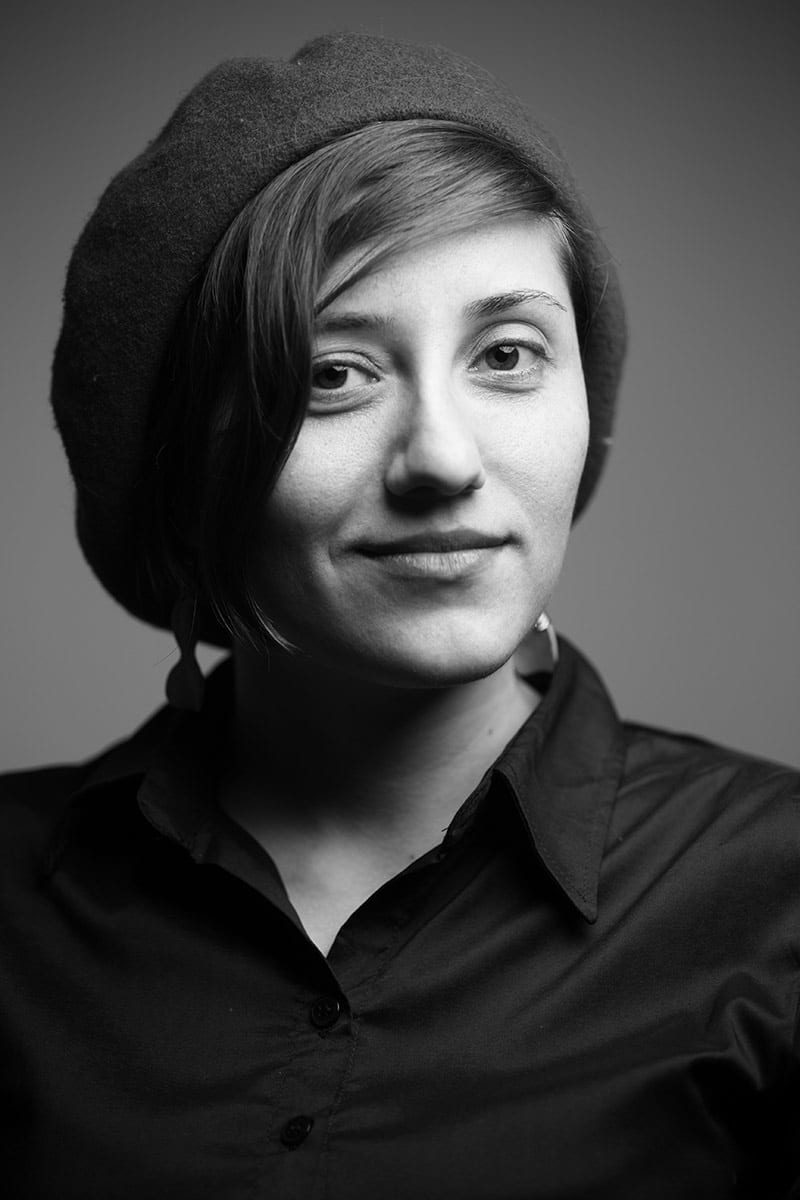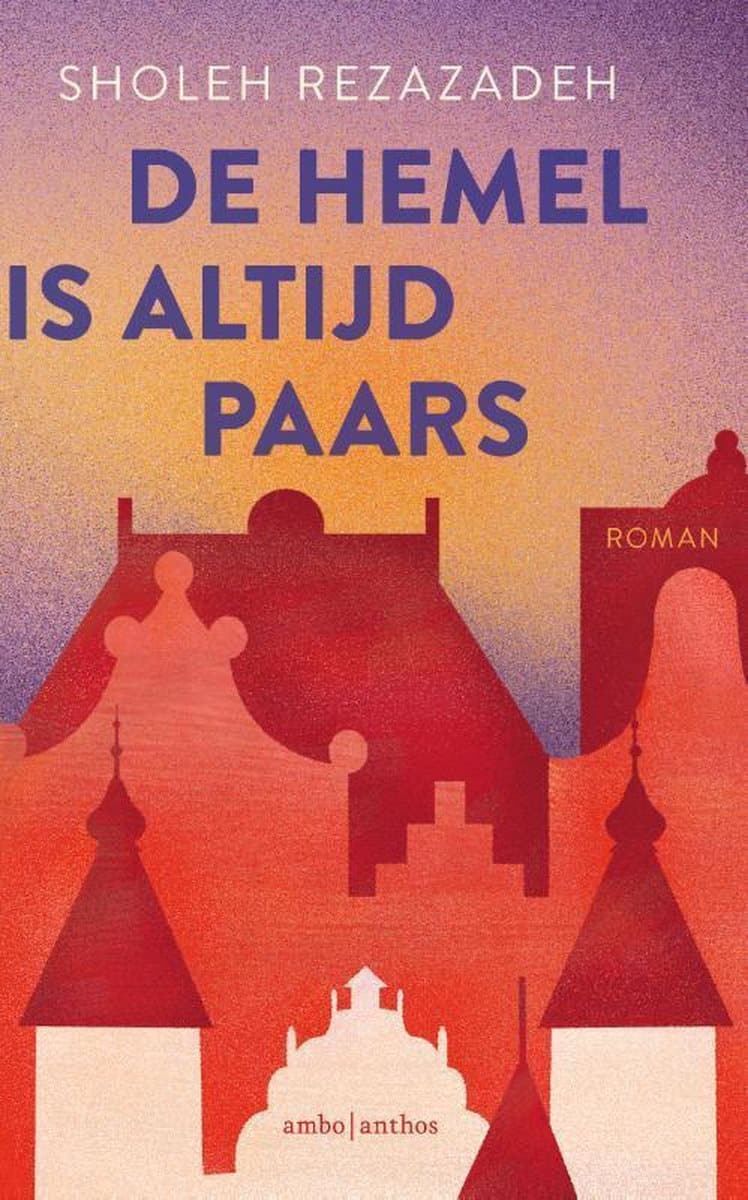‘De hemel is altijd paars’ by Sholeh Rezazadeh: From the Outside Looking In
Sholeh Rezazadeh has been living in the Netherlands for barely six years, long enough, it seems, to have crafted her own poetic sound in Dutch. Her debut novel De hemel is altijd paars (The Sky Is Always Purple) is a dreamy book about the love of trees and the loneliness of surviving in a new country.
There are more writers whose living environments change in adulthood and who master a new language in a new country. In the Dutch language area, for example, we have Kader Abdolah, who fled Iran in the 1980s in his thirties and learned his first words of Dutch in a centre for asylum seekers. Those first, confusing years in his new country featured in his book Papegaai vloog over de IJssel (2014; Parrot Flew Over the IJssel).
 Sholeh Rezazadeh
Sholeh Rezazadeh© Afra Afrasiabi
The story of Rodaan Al Galidi is also well known. As a refugee from Iraq at the end of the 1980s who had exhausted all legal routes to asylum, he was not entitled to Dutch language lessons, so he taught himself. It didn’t stop him from becoming an acclaimed poet later when he had received a residence permit thanks to a general amnesty in 2007. He has been publishing poetry in Dutch since the end of the last century, but only reached a wider audience in 2016 with the particularly witty yet hard-hitting novel Hoe ik talent voor het leven kreeg (How I Got Talent for Life), about his experiences as an asylum seeker dealing with bureaucratic rules that verge on the absurd.
The mixing of foreign-language elements into the Dutch newly acquired by those authors often resulted in prose that was very beautiful, clear, and refreshing, and that is no different for debuting author Sholeh Rezazadeh (b. 1990). What is striking is the speed with which she has made Dutch her own. Barely six years ago, she followed her lover from Iran to the Netherlands, three years later she had already won a writing competition and just a year later, in 2019, she won the El Hizjra Literature Prize for poetry, following in the footsteps of Rodaan Al Galidi.
And now there is a dazzling prose debut, De hemel is altijd paars (The Sky Is Always Purple), in which Rezazadeh tells the story of a newcomer in a Dutch city in dreamy, poetic language. Arghavan is a young Iranian woman who has only recently moved to the Netherlands. She runs a small second-hand shop, because she likes clothes and things with a story, such as the old colourful skirts on the clothes rack and the little blue ceramic coffee cup she once bought in a covered bazaar in Tabriz. When she looks at the cup, which is cracked in places, the smell of the bazaar tickles her nose. Proust is just around the corner here: when Arghavan thinks of the aroma of turmeric, cinnamon, and freshly shorn wool of hand-knotted carpets, she is instantly a girl of seven again.
And Arghavan also loves the trees across the street from her shop, Judas trees in bloom, which remind her of the trees in her garden in Iran. We meet Arghavan when she receives a letter from the council that the trees will soon be felled, as a safety measure. She doesn’t understand why:
I’ve never understood why humans are more important than anything else. Why is everything about the happiness of people? What have we done to Mother Earth that her trees have to be cut down to prevent them from falling on our heads?
She tries to share her love of trees with some of her more regular customers. With Anna, the dance teacher who is almost deaf; with Johan, an elderly man who records his conversations with trees on an old tape recorder; and with Mees, a young musician who, after several visits, announces with a smile that he is practising a Persian song. She daydreams gazing at the coffee cup that he touched with his fingers and his lips.
But gradually Arghavan learns how different the down-to-earth Mees is. And how difficult it is to fit into the Dutch mould, how little room there is “for those who feel different”. De hemel is altijd paars (The Sky Is Always Purple) is not only a mirror for the new country, but also an almost heartbreakingly beautiful book about loneliness, about what it is like to be slightly different from everyone around you.

Gradually, we also learn why Arghavan fled Iran, away from a mother who didn’t really want her and a father who took refuge in opium. She slowly interweaves the stories from her homeland with the experiences in her new country, her thoughts meander between there and here, constantly mirroring each other.
The result is a dreamy book, not only about loneliness, but also about love for nature, and how it is the dreamy, melancholic souls that help make life bearable.
An excerpt from 'De hemel is altijd paars', as translated by Paul Vincent
pp. 81-83
My lungs are full of woodland air in Low Fire Wood. Under our feet the roots of the trees are winding around each other. I see the trees looking at each other, their branches closely entwined. I hear the flapping wings of birds. Mees walks silently next to me.
I’d like to stay here for a very long time. I’d like to hug the trees, but I don’t. I have taken my shoes off and am standing in my bare feet on the roots of a tree. Mees looks at me in surprise. His fingers curl round the shoulder strap of his rucksack. He raises his eyebrows and stares at me. His glasses are dirty. He’s probably wondering why I don’t keep on walking and why like all foreigners I do everything so slowly?
Mees sighs and says with clearly audible disappointment: ‘Are you tired?’
I shake my head and say: ‘No, no. Not at all. I feel drunk. I feel great.’
I breathe in deeply. Together with the smell of woodland the scent of unripe walnuts flows through my lungs. ‘Come here a moment.’
Mees comes towards me. When he stands facing me, I can see the movement of his chest as he breathes in and out.
‘Take off your shoes and your socks,’ I say.
He puts his rucksack on the ground, takes off his shoes and socks and then says in a childish tone: ‘What now?’
The lenses of his glasses still bear the marks of the raindrops of an hour ago. One of those short, unpredictable showers that you sometimes get here.
‘Just look at the sky between the branches of the tree and try to feel the roots of the tree with your toes. Look at the leaves and how they wave in the wind and just listen to the sound of the birds.’ I close my eyes and hear Mees breathing. After a few seconds I ask: ‘Good feeling, isn’t it?’
‘Yes,’ he mutters.
I can feel his foot against the side of my foot. I close my eyes and try to think of the sky above my head and the earth under my feet. I want my toes to stretch and spread around Mees’ toes. I want us to wind around each other and grow together like two soft young branches. I want the smell of his body to mingle with mine, like the scent of the flowers in this wood. I want to be so close to him that I can distinguish the veins in his pupils. If I were to share my thoughts with him, could he not help laughing? Will he say that I’m fond of exaggerating?
I know that I will remember this moment for the rest of my life. I know that I will dream for many nights about these moments.
‘If we don’t get a move on, we’ll be sitting in the dark in a bit,’ says Mees.
I open my eyes and like on those days when you wake up early in the morning and rub the sleep from your eyes, I am not yet fully conscious and am not sure if I’m dreaming.
Mees pulls on his socks and shoes and says: ‘It’s a great spot,’ and hanging his rucksack back over his shoulders, he says: ‘Perhaps we’ll come back sometime.’
‘Great’ doesn’t do it justice. For me, words cannot express the beauty of this spot, in which tree, earth and sky are as one. I nod.
Sholeh Rezazadeh, De hemel is altijd paars, Ambo Anthos, Amsterdam, 2021, 184 pp.












